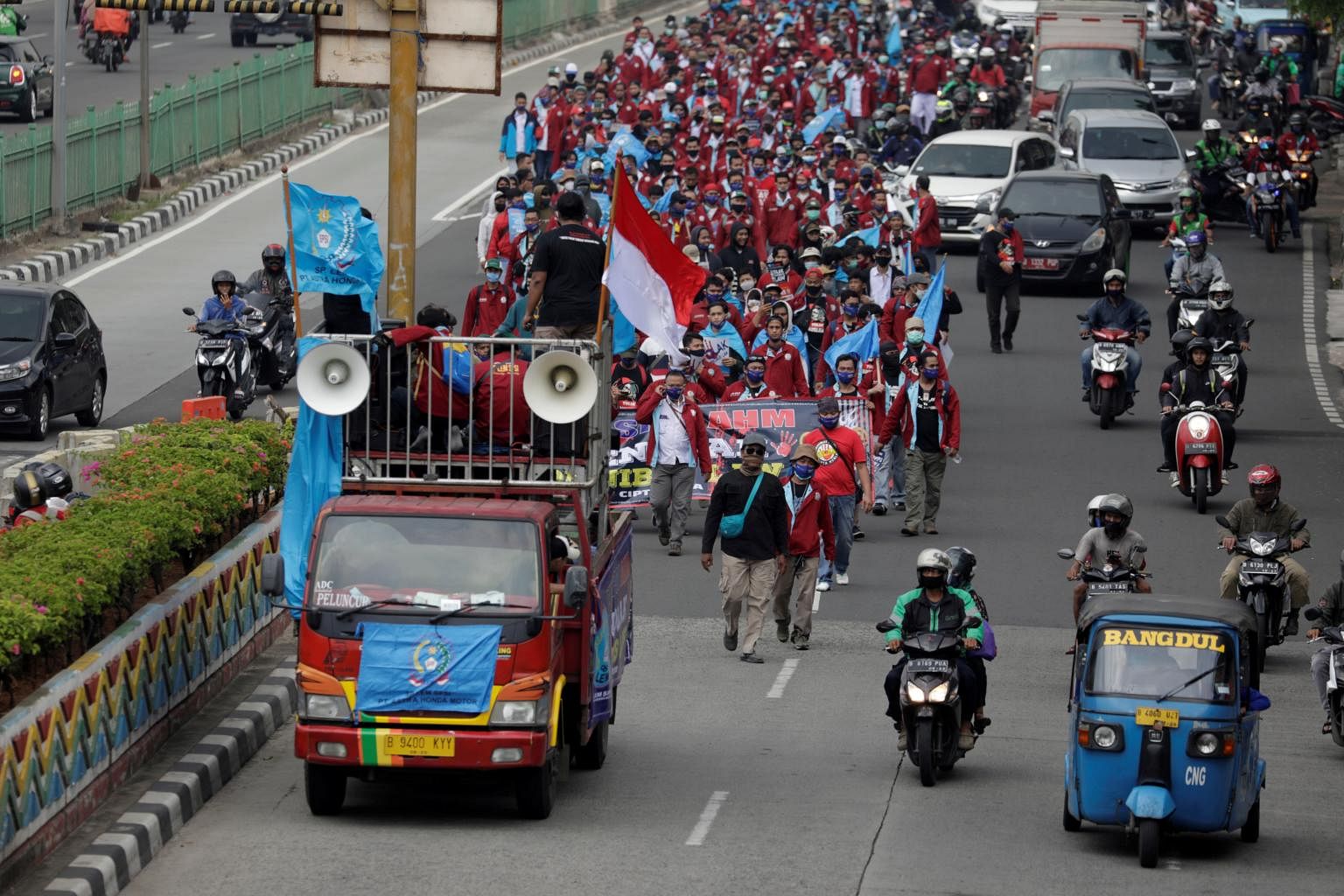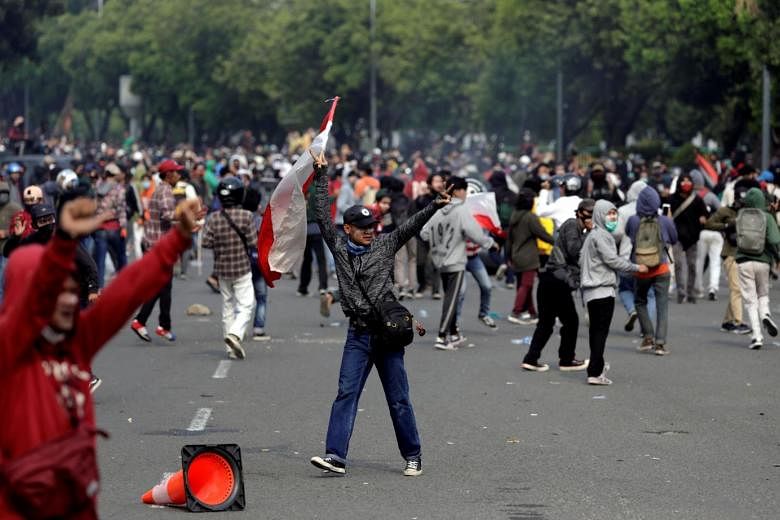JAKARTA - The iconic Tugu Selamat Datang, or welcome monument, in Jakarta featuring bronze statues of a man and a woman waving warmly, was last week a scene of violent protests over a new sweeping "omnibus law" to reform tax and labour.
Plumes of black smoke leapt into the sky after a bus stop near the city's landmark roundabout, known as Bundaran HI, was set ablaze last Thursday (Oct 8).
Riot police fired tear gas and water cannon to disperse the mobs, who also clashed near the National Monument, the Ministry of Energy and Mineral Resources, and the Presidential Palace.
Over three days, similar scenes repeated in at least a dozen cities across the vast archipelago, from Medan on Sumatra island in the west to Makassar on Sulawesi island in the east.
Tens of thousands of workers, from industries such as textile, energy, and automotive, had poured onto the streets in collective anger to demand the repeal of the Job Creation Law, passed in Parliament on Oct 5, three days earlier than scheduled.
While the government said the law would boost foreign investment and revive an economy battered by the coronavirus, protesters had slammed it as an attack on workers' welfare and the environment.
In Makassar, more than a thousand workers blocked roads and tried to force their way into the provincial parliament building.
Among them was 29-year-old Francain Edy, who had rallied for three days. Mr Francain, who works with a company distributing gas and water pipes, said he draws less than the monthly minimum wage of around $300 set for the city, and had to suffer more pay cuts during the pandemic.
"Our welfare is only going to worsen," he told The Straits Times, adding that he is worried about how the law might affect severance pay, rest days, and retirement benefits.
Most protesters had sketchy details of the law.
Ms Entin, 51, who works in a biscuit factory in Bandung, in West Java, said she had only heard the news from her friends.
The mother of six said she needed to support her children, who were either in school or paid lowly.
"I'm anxious. I'm only getting older every day, and less productive," she said.
"What will happen to my children in the future? They don't have proper qualifications. It's already tough getting a job, why does the government have to bother labourers like us?" she added.
Textile worker Deden, 43, shared similar sentiments. He said: "The rules are pro-investor. Why doesn't the government go after the corruptors first, why always pressure us labourers?"
Over 900 pages long, the Job Creation Law amended more than 70 existing laws and over 1,200 clauses, mainly to cut red tape and trim overlapping regulations particularly in business licensing and taxation matters.
Seven of nine political parties had backed the pro-business reforms, which are expected to create jobs for 2.9 million young people entering the labour market each year and 6.9 million people left unemployed due to the pandemic.
Labour unions, however, were miffed that severance pay would be slashed, minimum wages affected, and people could be employed on a contract basis indefinitely.
Environmentalists also saw red that provinces would no longer need to maintain a minimum forest cover of 30 per cent of provincial land, as well as the scrapping of a strict liability clause which provides a legal basis to sue corporations for causing environmental damage such as forest fires.
Nahdlatul Ulama, the country's biggest Muslim organisation, also criticised the law as benefiting only capitalists and trampling on common folk. Its chairman, Mr Said Aqil Siradj, said: "The rich get richer, the poor get poorer."

Unlikely repeal
President Joko Widodo had defended the law last Friday after his working visit to Central Kalimantan triggered a trending Twitter topic with hashtag #JokowiKabur (Jokowi Runs Away).
He said the protests were driven by disinformation and hoax news on social media, and promised to roll out within three months government regulations (PP) and presidential regulations (Perpres) which will provide guidelines on how the principles of the law should be implemented.
Mr Joko, or Jokowi as he is better known, also invited public suggestions, as calm returned on Friday.
But challengers of the law are now preparing to seek a judicial review in the constitutional court.
Rumours have since swirled of influential figures bankrolling the protests.
Alluding to the possibility, Coordinating Minister for Economic Affairs Airlangga Hartarto was quoted by CNBC Indonesia on Thursday: "The government knows who is behind the demonstration. We know who is moving it. We know who the sponsor is, we know who had financed it."
Covid-19 and instability fears
With the pandemic raging in Indonesia, a more immediate concern is whether the rallies would lead to further spikes in cases. As of Saturday, positive cases had passed 328,000 and deaths hit over 11,700, the highest in Southeast Asia.
In total, 3,800 protesters, some allegedly armed with sharp weapons and Molotov cocktails, were rounded up nationwide. In Jakarta, around 34 people rounded up were found to be positive for Covid-19 in antibody tests.
For some, the protests had sparked memories of the bloody May 1998 riots marked by civil unrest which was triggered by economic problems, including food shortages and mass unemployment.
Dr Mohammad Faisal, executive director of Centre of Reform on Economics Indonesia, however, did not think the tragedy will happen again, as Indonesia's economy is in a better shape thanks to low inflation and a stable rupiah. But he cautioned against further instability.
He told The Straits Times: "In 1998, our economy was under pressure and it was worsened by political instability. We don't want that to happen again."

